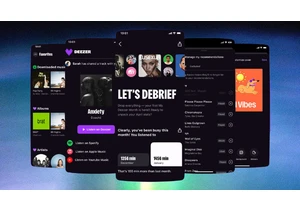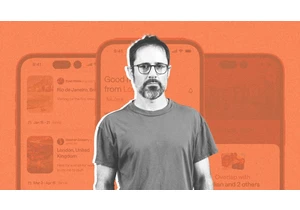Forget about new iPhones, Web3, and augmented reality headsets. The most exciting tech product category in 2022 is the lowly laptop. Once thought to be on the decline in both sales and importance, laptops are suddenly cool again. It turns out that if you’re working from home, having a decent full-featured computer is pretty important. While this isn’t a new revelation—worldwide PC shipments are up 34% from 2017, according to International Data Corp.—laptop makers are finally meeting users’ demands with better hardware and software. Even if laptop sales don’t increase at the same rates they have over the past couple of years, the products themselves are getting more interesting, thanks to better processors, more innovative designs, and stronger connections to the phone in your pocket. And unlike the blockchain or the metaverse, those improvements will actually have immediate and tangible impacts. A new chip war Apple’s M-series MacBook processors alone have delivered a jolt to the laptop market. While the M1-powered MacBook Air and 13-inch MacBook Pro had the same designs as their predecessors when they launched in 2020, last year’s 14- and 16-inch MacBook Pros got a proper design overhaul with Apple silicon in mind. This year, Apple will likely bring a similar upgrade to the MacBook Air, its most popular laptop, with rumors hinting at a thinner and lighter design, more colors, and a new M2 processor. Pat Moorhead, president of Moor Insights and Strategy, believes Apple will also release a cheaper “SE” laptop in the $800 price range, echoing a sentiment expressed by several other tech pundits. (Equally plausible: The company could keep the existing M1 MacBook Air around at a lower price.) “That would shake up the market big-time to have a premium design at a $799 everyday price,” Moorhead says. Apple’s newfound zeal for the Mac has left other chipmakers scrambling to respond, and the result will be better MacBook alternatives, even if they can’t quite match Apple silicon. AMD says that laptops based on its Ryzen 6000 chip will offer 24 hours of battery life—a dubious claim derived from low-impact benchmark tests, but one that should at least translate to all-day computing in the real world. The company is also promising double the gaming performance compared to previous-generation chips, allowing laptops with integrated graphics to function as decent gaming machines. Intel, meanwhile, has boasted that its 12th-generation H-Series processors can outperform Apple’s M1 Max, even if they’re not as battery efficient. A laptop with Ryzen inside [Photo: courtesy of AMD]The laptop revival has also piqued the interest of mobile chip makers such as Qualcomm, whose Snapdragon 8cx Gen 3 notebook chips promise an 85% performance boost over the previous generation. MediaTek is also looking to move upmarket with its Kompanio 1380 processor, which will debut in the Acer Spin 513 Chromebook. Carolina Milanesi, president and principal analyst at Creative Strategies, expects laptops based on the new Qualcomm chips to arrive later this year, offering the kind of multiday battery life and instant wake times that have never quite been possible with Intel- or AMD-based laptops. “All those things that make a smartphone experience into a smartphone experience will be put into the PC,” Milanesi says. More mobile tie-ins A fear of Apple’s laptop resurgence may also explain why both Microsoft and Google are pushing for more integrations that link Windows and Android. Microsoft is partnering with Amazon to bring Android apps to Windows 11, while Google is planning to bring Android games from the Play Store to PCs this year. Google is also working on more ways to connect Android to Windows, such as with synced text messages, file sharing, and easier Bluetooth device syncing. Amazon’s Kindle app on Windows 11 [Photo: courtesy of Microsoft]Why now? Moorhead notes that both companies tried to build their own cross-device ecosystems in the past, but with little success. Microsoft’s mobile phone efforts ended in failure, and the company could never get many developers on board with making tablet-friendly Windows apps. At the same time, Google has struggled to build a vibrant ecosystem of Android tablet apps, which in turn has hurt the experience of running Android apps on Chromebooks. As Apple deepens the ties between its iOS and MacOS platforms, its rivals have little choice to but to embrace one another’s open ecosystems. “I think that both companies wanted to have their own successful, closed ecosystems, but realized they can’t be Apple,” Moorhead says. “The next-best strategy is to do exactly the opposite of what your enemy does.” Evolving hardware Laptop makers are also latching onto more practical hardware improvements aimed at remote work. Laptops with 1080p webcams will become more common, with Lenovo even including a 1.4μm sensor for low lighting into its X1 ThinkPads. And while speaker quality has often been an afterthought, that’s starting to change in response to users’ videoconferencing demands. Milanesi notes that the HP Dragonfly G3, for instance, has four speakers with discrete amplifiers and AI-based noise reduction. The ThinkPad Z-series [Photo: courtesy of Lenovo]“With audio, consumers never seem to actually want to pay for it, but you notice it when you don’t have a good experience,” she says. “It’s another area that [manufacturers] have been focusing on.” Laptop makers are even addressing some long-standing frustrations that aren’t related to remote work. Dell, Lenovo, and HP all announced laptops with haptic trackpads—including Dell’s radically redesigned XPS 13 Plus—which trade physical click mechanisms for simulated ones, similar to the trackpads in Apple’s MacBooks. It’s a welcome shift given that even the fanciest Windows laptops often suffer from overly stiff click mechanisms. The industry’s starting to pay more attention to sustainability as well. Milanesi praised Lenovo’s use of recycled aluminum and recycled vegan leather in its Z-series ThinkPads, and companies like Framework are proving that laptops can be easier to repair and upgrade. (While no major PC makers announced any big initiatives around reparability at CES, Dell put together a concept modular laptop to show how it’s testing more sustainable designs.) And, of course, laptop makers can’t resist a bit of spectacle as well. During the CES trade show in early January, Asus teased the Zenbook 17 Fold, a 17-inch tablet with a foldable display and attachable keyboard deck that can transform into a 12-inch laptop. Lenovo also announced the ThinkBook Plus Gen 3, an ultrawide 17-inch laptop with a tablet-size display next to the keyboard for drawing and multitasking. Zenbook 17 Fold [Photo: courtesy of Asus]These kinds of high-concept ideas are clearly experimental in nature, but they also provide a glimpse at where laptops may be headed next. Besides, in a year of intensifying competition among laptop makers, it’s neat to see some of them swing for the fences. As Moorhead notes: “I believe it is a legitimate desire to find something new and exciting that sticks.”
Login to add comment
Other posts in this group

If real Easter eggs aren’t your thing this weekend, you may find hunting for digital ones more enjoyable. And there are some cool ones to find at your fingertips, provided you have an iPhone or Ma

With music streaming, users have gotten used to being at the mercy of algorithms. But French music streamer Deezer is making it easier for its subscribers to make the algorithm work for them.

Trying to get from point A to point B? If only it were that simple! With any manner of travel these days, you’ve got options: planes, trains, buses, ferries, and beyond. And finding the best

When Twitter cofounder and Medium founder Evan “Ev” Williams was planning his 50th birthday party, he didn’t know who to invite. Having spent more of his life building and scaling tech

If you thought you’d heard the last of the viral “Apple” dance, think again. The TikToker behind it is now suing Roblox over its unauthorized use.
Last year, during the height of Brat su

A Wall Street Journal report this week gave an extensive look into how Elon Musk, the

Netflix fared better than analysts anticipated during the first thr
